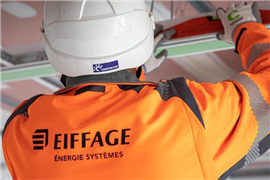Ashtead Group downsizes as demand weakens
09 December 2008

Ashtead Group has announced a restructuring programme to save £45 million annually to reduce the size of the business to the lower levels of demand anticipated for 2009.
Ashtead said the programme would see depot closures, a 7% reduction in the size of the fleet and a cost reduction programme, with the majority of savings expected to be realised by the end of April 2009. Cost savings will come mainly from store closures, job cuts, a reduction in the number of delivery vehicles and lower depreciation charges on the smaller fleet.
The company has not said how many depots will be closed, although Ashtead chief executive Geoff Drabble said in a conference call for investment analysts that there would be more closures in the UK than in the US, "but that's because we have got lots of smaller sites in the UK". In the US, he said there were opportunities for some closures where the company has clusters of six or seven depots in major metropolitan areas. In such cases, the reduction would likely be a single location, he said.
Ashtead has booked a £36 million charge in the six months to 31 October relating to devaluations of equipment to be sold as part of the restructuring, with a further £19 million charge expected in the second half of the year (to April 2009).
Group revenues for the second quarter to 31 October rose 7% to £546.3 million with underlying profit before tax also up 7% to £76.6 million, with the figures benefitting from the stronger dollar against sterling. In dollar currency Sunbelt Rentals' revenues were marginally down at US$418.3 million, with operating profit down 15% to $95.1 million. In the UK, A-Plant saw revenues fall by 3.6% to £54.4 million and operating profits were 25% lower at £7.1 million.
Mr Drabble said the group had continued to perform well "against the background of weakening market conditions" but that the outlook for the second half of its financial year (to the end of April 2009) was "weaker and difficult to predict".
He said it was important to take prompt action to adapt the company for the future trading environment; "We are, today, announcing a restructuring programme which will right size the business for the anticipated lower levels of demand. Based upon the success of our ongoing focus on operational efficiency, we are confident that this programme will generate cost savings of £45m per annum. Whilst generating an exceptional cost to the business the programme also has the benefit of being cash positive due to the fleet disposals."
Capital expenditure in the six months to 31 October was down 21% to £201.51 million and Ashtead said next year's expenditure would be reduced significantly.
Ashtead said; "All major forward indicators now point towards a somewhat greater reduction in non-residential construction activity than that expected at the end of our first quarter. The private sector has been first to see a slow down, particularly amongst the smaller builders. Sectors which are most exposed to consumer spending, such as retail, are being affected first and a number of projects have been postponed or cancelled.
"Infrastructure work is likely to remain good for the medium term with particular areas of strength being utilities, prisons, schooling and transportation. Future strength, however, depends on central funding and both US and UK administrations have highlighted the need for increased public sector investment to improve ageing infrastructure and support employment."
For Sunbelt, market weakness was most pronounced in Florida and California, while other markets, particularly Texas, continued to grow strongly. Physical utilisation in the first half was flat at 70%.
Ashtead said the UK market for A-Plant was "broadly flat in terms of non-residential construction but where there was a substantial fall in residential construction. Whilst residential construction represents only around 10% of A-Plant's revenues, the rapid and substantial decline in UK house building this summer limited overall revenue growth."
The UK utilisation rate was 69%, which is 2% below last year's level. Rental rates in the second quarter were broadly unchanged from the first quarter, but fell 9% compared to the previous year "as increasing apprehension about the outlook impacted rates in the competitive UK rental market."






